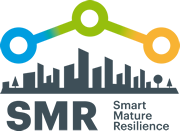Glasgow City Council welcomed project partners, project cities and local stakeholders to the Lighthouse, Glasgow this morning for the first day of the Smart Mature Resilience project’s review workshop. During the morning session, the partners built on progress made at the project’s recent workshop, where European cities and a group of projects focusing on related topics met to compare tool development and discuss the optimal conditions for developing possible standards for resilience management in cities.
The SMR project is developing a Resilience Management Guideline supported by five tools, which provides a pathway to lead cities towards a more resilient future. Each tool serves a complementary purpose. The Resilience Maturity Model helps cities to identify their level of resilience maturity and helps them to identify policies that would be helpful measures towards resilience-building. The Risk Systemicity Questionnaire can bring together diverse stakeholders in a city to better understand their awareness of risk and the interrelatedness of risk. The Resilience Information Portal can provide useful software to cities, which they can use to make their communication system more resilient.
During the workshop in Glasgow, cities and scientific partners worked closely together to continue co-development of the System Dynamics Model, which is a game-like online learning tool to help strategic managers and other stakeholders involved in budgeting and strategic planning for resilience in cities identify and decide the most efficient and most strategically accurate policies to implement, and the order in which to do this.
The tool functions with an interactive interface, where users input a symbolic budget for resilience development and adjust the proportional investment in different areas regarding resilience for their city. The user can then run simulations of the effects of prioritizing investment in different areas in different order, using the tool as a kind of playground to trial methods of policy prioritization in a safe environment. Intensive collaborative sessions and exercises with TECNUN, University of Navarra and CIEM, University of Agder collected input from the SMR cities of Glasgow, Kristiansand, Donostia, Vejle, Rome, Riga and Bristol to validate the tool and ensure that it is an ideal format for immediate application and use by cities.
A further tool for Resilience Policies will then provide information, examples and case studies of the policies identified through the Resilience Maturity Model and the System Dynamics Model. The workshop will continue tomorrow with sessions hosted by the University of Strathclyde to work with cities on co-developing this tool.
Impressions of the first day are available at https://www.flickr.com/photos/iclei_europe/sets/72157683833382116/with/34331508890/. You can find out more about Glasgow and SMR at http://smr-project.eu/glasgow/.



